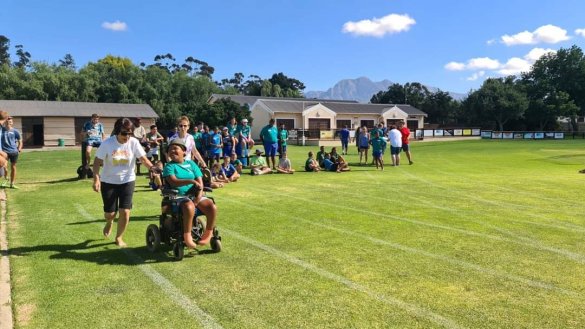No-one left behind at Langerug School
8 April 2022
A video of Langerug School's principal, Cecile de Villiers, running with a learner in a wheelchair during the school's athletics meeting received 180 000 views after it was shared on social media by the South African Teachers’ Union, the SAOU.
Both De Villiers and the learner had huge smiles on their faces as they completed the 100-meter distance while cheered on by spectators. The SAOU captioned the video by saying no-one at the school in Worcester is left behind. People commenting on the video applauded De Villiers for setting a great example and clearly demonstrating her love and compassion for children.
Please see video here: https://www.facebook.com/saou278/videos/627979481605271
De Villiers said learners at the school have specific learning difficulties and the staff aims to address those needs as efficiently as possible. “We provide the same level of support to everyone, yet different kinds at different times, dictated by the needs of the child.”
Langerug School opened its doors in 2015. Learners with learning barriers originally received their tuition at Pioneer School for Visually Impaired learners. In 2014 the Western Cape Education Department granted permission for establishing a separate institution and De Villiers recalls the excitement to decide on a name, motto, school badge, school song and school uniform for the school.
The Autism unit at the school has grown to five classes since their first intake of learners on the Autism Spectrum in 2017. These learners are grouped according to their ages into Foundation Phase, Intermediate Phase and Skills classes.
Learners admitted to the school have an average cognitive ability, but because of learning barriers ranging from dyslexia and reading and writing problems to dyscalculia, their academic performance is not in accordance with their potential. Additional barriers such as ADHD, ADD, autism, anxiety, depression, diabetes and epilepsy demand intensive intervention strategies in order to ensure academic success.
De Villiers said staff members are constantly making plans to accommodate and address learners’ barriers and challenges and they never give up on children. “Each child receives a blank page when we admit them. We discard everything we read in files and work with what the child presents to us.”
She added that addressing a child’s autism and finding ways in which they can manage themselves in a structured environment is very rewarding. “Teaching social skills and seeing how they implement these in daily living, and getting feedback from parents of how skills taught at school are transferred home – that is our satisfaction and why we do what we do to the best of our abilities.
“As far as inclusion is concerned, we don’t think about it, and we don’t plan for it. We simply open all the school activities to all our learners who wish to participate. We have had a learner in a wheelchair dancing, and running the 100m at our annual athletics meet. We have helped athletes to acquire their provincial colours in athletics by transporting them to venues and paying for their sports gear when parents were unable to foot the bill. We develop learners holistically and even take care of emotional development, as our Care Club testifies – the club where you join to show that you are kind and care about others.
“No child is left behind because every child is important. To us inclusion is who we are and not what we do. We therefore have an inclusive culture and inclusive practices in all spheres of the school.
“We are educators. We are developers. We are enablers. Our biggest challenge is to empower learners in order for them to reach their potential and be able to find their place in society. Our school’s motto is ‘Fulfil your potential’, therefore we endeavour to assist every learner in every way possible in fulfilling theirs.”

